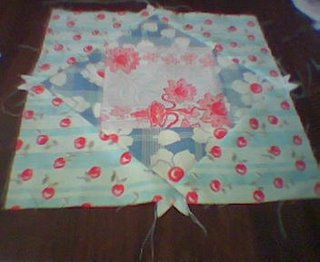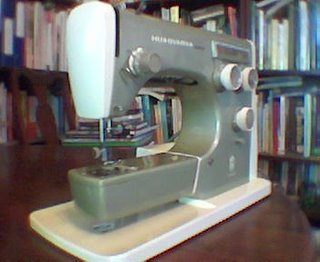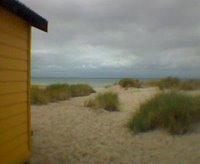In the Garden
Last week in my box there was the January edition of the Scottish Rock Garden Club Journal - the articles are excellent, including:
- "Growing Aril Irises" by John Lonsdale - these irises are difficult to grow - coming from some of the coldest and dryest areas. I. kikwoodii which is pictured is on my wishlist - see John's website for more pictures;
- "Erythroniums" which is a photo essay by Ian Young. . Ian writes a really interesting weekly 'Bulb Log' on the Scottish Rock Garden site.
Also in my letter box the latest pack of seeds - this time from Vlastimil Pilous in the Czech Republic. He has a fantastic seed list and I was luck to recieve some really choice plants including Jeffersonia dubia, Paraquilegia amenonoides and Paris delavayii. Of course the trick is to plant them and then cross fingers and hope they germinate (and then hope that they grow on... ).
Tony Hall, who was until last year in charge of both the Alpine and Woodland departments at Kew Gardens in the UK, spoke to my hort group, the Alpine Garden Society Victorian Group (AGSVG), just before Christmas. It was a great talk, and one of the gems of knowledge that he passed on was that he uses smoke water on most of his seed to help it germinate. So I have found a company in Melbourne that sells it and in the next week I should have it in my hot little hands. Then I will plant all the seeds currently sitting around on my side board.
And my other gardening news is that I am deeply into organising the:
AGSVG - Trough Making One Day Workshop - Saturday April 29
The AGSVG is holding a fund raising event where we are going to show gardeners how to make troughs for the garden. It's a group effort with many people generously donating time and 'in kind'. The Age Newspaper and Marcus Harvey, who puts out a 'to die for' bulb list, have both advertised it for free and we have already 3/4 filled the available spaces!
What are troughs I hear you ask - well...
Although not common in Australia, troughs are widely used in the UK, Europe and the USA for growing tiny plant treasures that would otherwise get lost in the garden and difficult plants that require special growing conditions. They can also look terrific in the garden if placed cleverly. 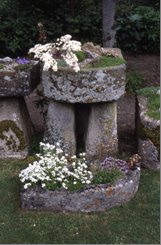 Many old and famous gardens contain troughs including Wisley, Kew, Edinburgh Botanic Gardens, Gravetye Manor, Sissinghurst and Rodmarton (pictured right - and one of my favorite gardens - I'm an Arts and Crafts fan and there is a whole chapter on this garden in Jane Brown's 'The English Garden Through the 20th Century').
Many old and famous gardens contain troughs including Wisley, Kew, Edinburgh Botanic Gardens, Gravetye Manor, Sissinghurst and Rodmarton (pictured right - and one of my favorite gardens - I'm an Arts and Crafts fan and there is a whole chapter on this garden in Jane Brown's 'The English Garden Through the 20th Century').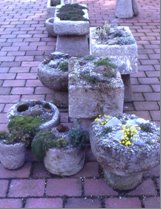 Traditionally troughs were made out of stone. Nowadays most troughs are made out of a mix called ‘hypertufa’, which is set in moulds. This type of trough is easily made by the just about anyone once you know how!
Traditionally troughs were made out of stone. Nowadays most troughs are made out of a mix called ‘hypertufa’, which is set in moulds. This type of trough is easily made by the just about anyone once you know how!
At the workshop, everyone will make a trough to take home. There will also be two lectures, a plant stall, and a garden visit... should be a great day!
We are really looking forward to it - despite the hard work and worry it entails... like the difficult questions such as how many cubic meters of stone and pine bark will be required? can we borrow four cement mixers to mix the hypertufa and who do we know who can operate them? ... who can we borrow tarps from just in case it rains? (which it won't - she says emphatically!) ... you get the idea...




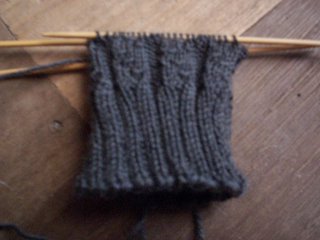

















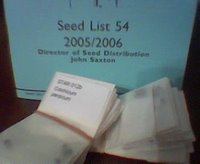





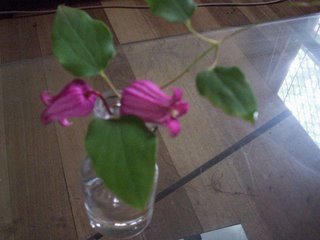




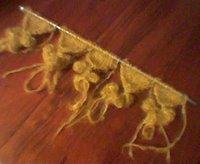




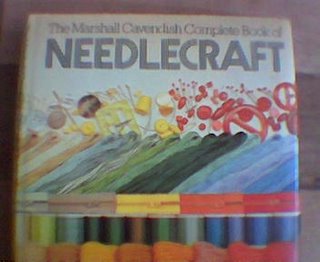
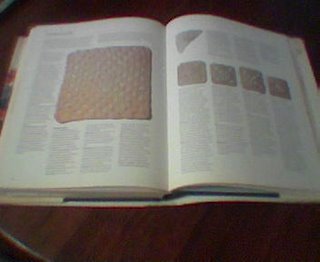






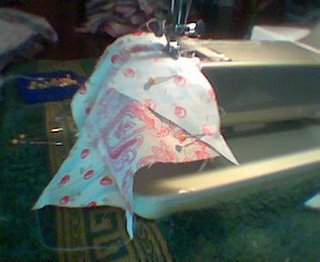 I have always wanted my own patchwork quilt. I have lusted after them in magazines, but have never been able to justify the outrageous prices in the stores. But it is not just cost that has stopped me from buying one - the thought of one made by my own hands has always held great appeal.
I have always wanted my own patchwork quilt. I have lusted after them in magazines, but have never been able to justify the outrageous prices in the stores. But it is not just cost that has stopped me from buying one - the thought of one made by my own hands has always held great appeal.
